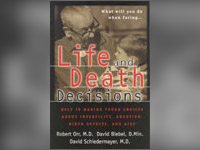Life and Death Decisions: Help in Making Tough Choices About Infertility, Abortion, Birth Defects, and AIDS (Robert Orr, David Biebel, and David Schiedermayer; 1996)

Consider this case study, one of many that Orr, Biebel, and Schiedermayer provide for discussion:
Eight-year-old Josh has a congenital kidney and bone disease. Three kidney transplants have failed, and he has had multiple severe complications. He is now on dialysis. He screams in pain each time blood is drawn or the dialysis needle is inserted. He sometimes asks the doctor to stop dialysis. His parents are torn between the desire to keep him alive and the wish to see his suffering end. Josh’s father confides, in addition, that Josh’s care is nearly bankrupting the family.
How does the principle of the sanctity of life apply here? Does this principle mean that we can never stop treatment?
What role should cost have in this case? Is further dialysis of Josh medically futile?
How would you treat Josh? Would you stop dialysis? Could death (which would occur fairly soon and without pain) ever be seen as in his best interest? Explain your reasoning.
Read the story of David’s response to his own critically ill child (2 Samuel 12:12-23). How might this apply to Josh’s case?
If there was ever a time when ordinary people could simply leave medical ethics to their physicians, now is not that time. As medical knowledge and technology advance, more and more individuals are being called upon to make vital choices, for themselves or for someone they love. And they must often make those decisions in the midst of suffering and grief, when there is precious little time to pray, and even less time to reflect. Working through the basic issues involved is wise, and these two volumes will help Christians do exactly that.
The two books form a set, and we recommend you get both. Each chapter is clearly written, and each is followed by a set of questions for discussion. The books are ideal for Sunday School classes, small groups, or for families with older children. You may not agree with everything you read in these volumes, but they will help you think biblically about some very crucial issues—issues which should be considered with care before we are required to make the difficult choices they involve for ourselves or for our loved ones.
Both Life and Death Decisions and More Life and Death Decisions have identical first and last chapters: A Christian Perspective on Medical Ethics, and A Support System for Decision Makers.
Then, Life and Death Decisions goes on to cover, in separate chapters: infertility, abortion, newborns with severe problems, and AIDS.
More Life and Death Decisions has chapters on: caring for the elderly, administering fluids and nutrition, euthanasia and assisted suicide, treatment decisions, and withholding and withdrawing treatment.
By way of introducing the authors: Robert Orr, M.D., is director of clinical ethics and associate professor of family medicine at Loma Linda University Medical Center in California. David Biebel, D.Min., is a minister with the Evangelical Free Church serving on the staff of the Christian Medical and Dental Society. And David Schiedermayer, M.D., practices internal medicine at the County Hospital in Milwaukee, WI, and teaches ethics at Trinity Evangelical Divinity School in Deerfield, IL.

